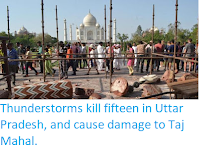At least 41 people have died as a series of storms swept across India on Sunday 13 May 2018. Twelve people in West Bengal and nine in Andhra Pradesh are reported to have died directly as a result of lightning strikes while gathering crops, while in Uttar Pradesh and Dehli another 20 people died in a series of dust, hail, and thunder storms which brought down trees and power lines, damaged homes and caused a number of fires.
A dust storm hits the city of Ghaziabad in Uttar Pradesh on Sunday 13 May 2018. Indira Punam/Asian News International.
Thunder and dust storms are a common phenomena in arid regions, and are caused by
high winds lifting particles from the ground. These are common in northern India in the summer season, a three month hot period lasting from
March to June, when temperatures can pass 45° but humidity remains low,
and high winds are particularly common ahead of the onset of the monsoon
season.
Warm moist air passing over the surface of the Earth acts as an
electrical generator, creating a negative charge in the cloud tops and a
positive charge at the ground (or occasionally in a second cloud
layer). The atmosphere acts as an electrical insulator, allowing this
potential to build up, until water begins to precipitate out. This
allows a channel of ionised air to form, carrying a current between the
clouds and the ground, which we perceive as lightning.
See also...
Follow Sciency Thoughts on Facebook.







